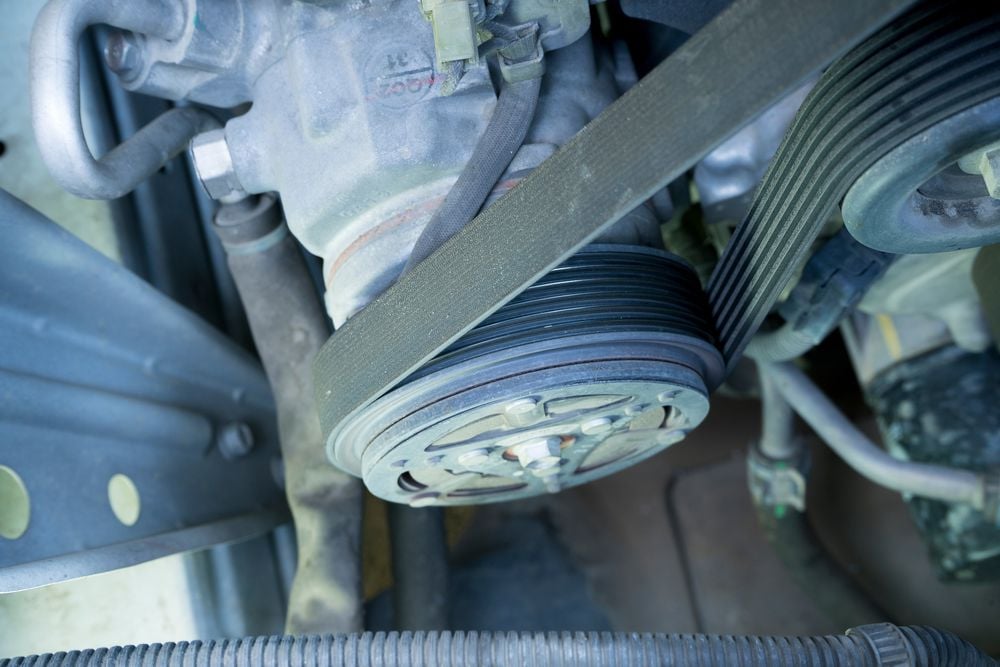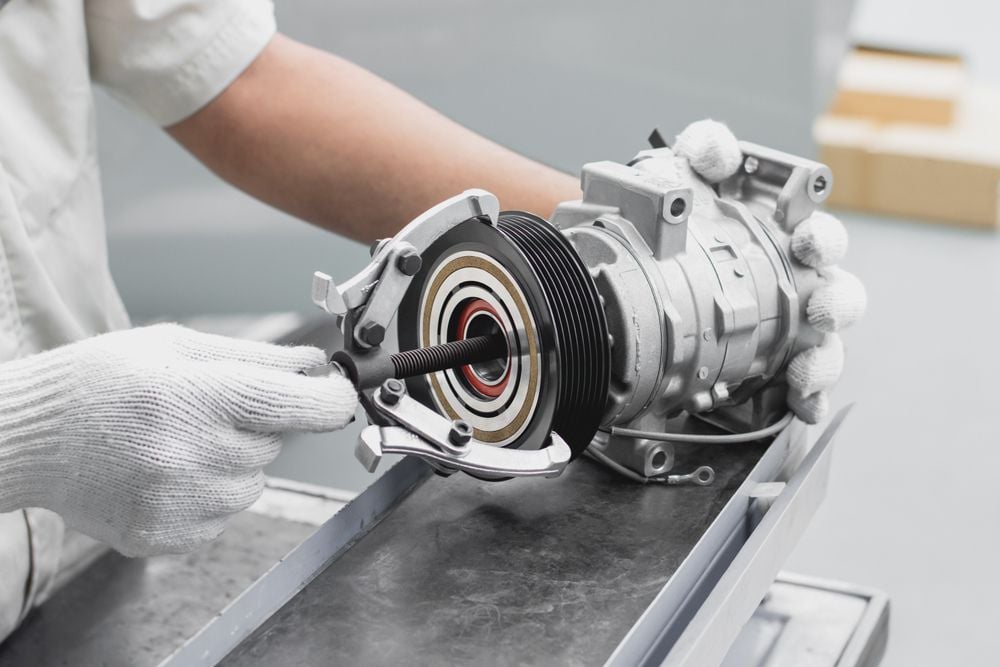If you happen to notice grinding or whining sounds coming from your AC, if the clutch is getting stuck and causing the vehicle to stall when the AC is switched on, or if you notice the air of your unit beginning to turn warm, these could all indicate a faulty AC compressor.
Noises present when the AC runs often indicate that the compressor is beginning to fail or has already failed.
If your vehicle stalls when the AC is turned on, it could also point to an issue with the clutch of your compressor sticking.
Also, if you notice warm air has replaced the cool air that usually blows out from the vents of your car, then that's another obvious sign that something is wrong with your compressor.
This article will look over what happens when an AC compressor fails, the signs to look out for, whether or not it's worth replacing, and other commonly asked questions concerning a bad or faulty AC compressor.
 Air conditioner blowing warm air
Air conditioner blowing warm air
What Happens if an AC Compressor Fails in a Car?
When an AC compressor starts to go bad or completely fails in a car, the compressor will no longer be able to effectively distribute refrigerant inside the air conditioning system, which means that the refrigerant will not be able to cool the air that the unit puts out.
As a result, the air conditioning unit will blow out warm air through the vents instead of cold air, which can be uncomfortable for the driver and passengers, especially in summer when temperatures are steadily increasing.
As this happens, it will display specific noticeable symptoms that alert you that it's time for maintenance.
Signs of a Bad AC Compressor in My Car
Fortunately, it's not that difficult to recognize the signs of an AC compressor that has gone bad or is failing.
The symptoms are pretty easy to pick up on and diagnose, even without a mechanic.
These symptoms include:
1. Loud and Weird Noises
If you begin to notice strange sounds, such as whining, screeching, or grinding noises, when you turn on the air conditioning in your vehicle, it's a strong possibility that the compressor's bearings are going bad.
A good way to test if this is the case is to turn the AC off to see if the sounds stop.
If they do and you turn the AC back on only for them to start again, it's most likely the AC bearings at fault.
2. Airflow Problems
One of the earliest signs of a problem with the compressor is that the airflow from your vents has suddenly declined.
If you notice that the air conditioning unit is still working, but the air coming from the vents has decreased in power or efficiency, it can point to a bad or failing compressor.
Another sign is when you can hear your AC unit running, but no air is coming out of the vents.
3. Warm or Hot Air Blowing Out
The most evident sign that your AC compressor is out of sorts is that the air conditioning unit is blowing out warm or hot air instead of cold.
There are other causes of an AC blowing out warm air, too, such as being low on refrigerant.
However, if you've maintained your AC and refrigerant, the compressor is more likely to be the cause.
Similarly, if you've noticed the air is still cool but not as cold as it used to be, this could be an early symptom of a failing compressor.
This happens as the refrigerant leaks, and the air produced gradually loses its cooling power.
4. Leaking Fluid
The seals inside your compressor keep refrigerant from escaping and pressurize it so the refrigerant can cool down to produce cool air.
As it works to do these two things, the seals will start to wear down, causing them to become worn or damaged.
This can result in either a refrigerant or oil leak.
5. Clutch Getting Stuck
AC compressors have a clutch similar to manual transmissions that help the component run effectively.
The clutch works by drawing power from your vehicle's engine and distributing it to the AC compressor and system for them to work.
When the clutch gets stuck, the compressor will no longer be able to work since there will be no power to draw from; thus, the AC system will no longer work.
You will need to check underneath the hood to tell if the clutch is getting stuck or not working properly.
If the AC is turned on, the clutch should spin.
If it is not spinning or it makes odd noises, then it's a likely indication that the clutch is getting stuck and that there is an issue with the compressor itself.
6. Noticeable AC Compressor Damage
Similar to checking the clutch under the hood, it's advisable to check the entire compressor.
If you notice that the compressor or clutch is damaged, this can result from a problem internally.
The damage could be corrosion due to escaped moisture from oil or refrigerant leaks or components that are bent, broken, or leaking.
Either way, physical damage to the compressor is a sure sign of a problem within the component that needs to be addressed.
7. Smelling Burning Rubber
If you have started to smell burning rubber when switching the AC on, this can indicate an AC compressor that is seized.
This happens because the serpentine belt spins on the AC compressor bearings and will snap off due to the faulty compressor.
However, if you notice this smell without the AC being powered on, it could indicate another issue unrelated to the compressor.
8. Circuit Breaker Tripping
If your vehicle's circuit breaker to the condensing unit keeps breaking, it is likely due to overheating, which happens when the compressor tries to draw on too much power and is unable to do so.
This occurs as the circuit breaker does its job to keep you and your vehicle safe from potential fire hazards and outbreaks, so it is recommended to avoid continuously resetting the breaker.
How to Self-Diagnose a Faulty AC Compressor
As mentioned previously, diagnosing a faulty AC compressor is relatively easy.
Step One: Turn the AC on
The most obvious step to indicate a problem with the compressor is to turn the AC on full blast with the vehicle running.
Turning the vehicle and AC on will engage the air conditioner, which will then engage the compressor.
Step Two: Listen carefully
With the vehicle's engine and AC running, you'll need to listen for any strange noises that may be coming from the engine.
Step Three: Check for cool air
Next, be sure to check your vehicle's cabin's vents to see if there is air coming out and if it is cool or not.
There may be a compressor issue if it's cool but has diminished from being cold to just cool.
Similarly, if there is no air coming from the vents or if the air is warm or hot, this also indicates an issue with the compressor.
Step Four: Check for leaks
The last step in self-diagnosing compressor issues is checking for any visible leaks under the car.
Of course, leaks can happen for many reasons, but if this issue occurs along with the other issues, it's most likely a problem with the compressor.
 AC compressor
AC compressor
Can I Drive My Car With a Bad AC Compressor?
Most of the time, and as long as the AC is turned off; you'll be able to safely drive a car with a bad or failed AC compressor.
However, if the clutch or bearings have gone bad, you may not be able to drive your vehicle due to these components also driving power to the steering, water pump, and alternator.
A bad AC compressor can also damage and ruin the serpentine belt, especially if the compressor or clutch seizes.
If the clutch is bad, it is not recommended to continue operating the vehicle until this issue is resolved.
Is it Safe to Drive Without an AC Compressor?
In general, driving your vehicle without an AC compressor is entirely safe and won’t further damage your vehicle, as long as the clutch or bearings are not bad.
Whether or not you want to, though, depends entirely on your specific needs.
If the heat doesn't bother you that much, and the clutch and bearings are in good shape, it would be fine to operate the vehicle and drive without it.
Will a Bad AC Compressor Affect the Engine?
If your vehicle's bearings or clutch go bad, it may harm your engine.
This is because the engine can stall when the compressor sticks or if the serpentine belt breaks, resulting from a bad AC compressor.
Since the serpentine belt is connected to many different components, including the engine, a broken serpentine belt will affect all of these components.
 Rebuilding a AC compressor
Rebuilding a AC compressor
Can a Bad AC Compressor Cause a Car to Stall?
Yes, one of the negative impacts of a bad AC compressor on a vehicle is for the vehicle to end up stalling.
This typically occurs when the AC is turned on despite having a bad compressor.
When the compressor is bad, and the AC is turned on anyway, the compressor receives a signal to activate the clutch; however, since the compressor is not working as it should, this can create additional resistance, which, in the end, causes your vehicle to stall.
Can a Bad AC Compressor Cause a Car to Overheat?
While a bad AC compressor can not cause the vehicle to overheat itself, it can contribute to an overheating vehicle if the clutch of the faulty compressor is activated.
When the clutch of a faulty compressor is activated, the clutch will not function properly, which leads to a strain on the engine. This strain can cause the vehicle to overheat.
Does AC Compressor Affect Transmission?
Generally speaking, the AC compressor does not affect the transmission.
What is the Most Common Cause of AC Compressor Failure?
The most common cause of a failing AC compressor is the loss of lubrication which happens when a leak occurs that allows refrigerant and oil to leak out.
When a leak occurs, it is most often found in hoses, o-rings, flange gaskets, the evaporator, condenser, or the shaft seal of the compressor.
Another cause of lubrication loss is when a restriction occurs inside the AC system, such as a blockage of the orifice tube or expansion valve, which can make the compressor low on oil.
Is it Worth Replacing the Compressor on the AC Unit in the Car?
It will depend on your specific situation and the make and model of your vehicle.
Depending on your vehicle and where the component is located, AC compressors can be complicated to replace.
Plus, what makes things even more complicated is that you should replace certain other components alongside the compressor; the entire AC compressor, all of the seals that connect the AC lines, the accumulator or receiver drier, and the orifice tube.
Not to mention, when replacing a compressor, it will also need to be flushed and refilled.
Whether or not it's worth replacing the compressor depends on how old your car is and its mileage; if you have an older vehicle, it may make more sense to invest in a new vehicle instead of replacing the compressor.
How Much Does it Cost to Fix an AC Compressor in a Car?
AC compressor replacements can cost anywhere from $842 to $1146, but if you can replace the compressor yourself, you'd save quite a bit on labor costs.
If the clutch is the only issue with your compressor, it can sometimes be replaced independently; however, this requires specific tools and knowledge, and sometimes replacing the entire compressor is more cost-effective.
Is There a Way to Bypass the AC Compressor?
You can bypass the AC compressor by using a smaller serpentine belt on most engines.
You can also bypass the AC compressor by using a compressor bypass pulley which will need to be purchased and installed in place of the original AC system.
However, the bypass pulley is expensive and can generally cost more than it would cost to repair the compressor itself, so it would not make sense to purchase this tool over a new compressor or components for the new compressor.
FAQ
Will the Heater Work Without an AC Compressor in the Car?
Yes, the heater is independent of the AC compressor and will work without an AC Compressor in the Car.
Running the heater without an AC compressor will allow the vehicle to be heated in the colder months, keeping you and your passengers warm.
Will the AC Compressor Make the Check Engine Light Come On?
If you have an electric compressor, a failing or bad AC compressor can cause the check engine light to come on.
Conclusion
Many people wonder about the AC compressor, whether their car can function properly without one, or if it's safe to operate a vehicle without one.
Some people also ask, "what are the signs of a bad AC compressor in my car"?
While the car can adequately work without an AC compressor, there are certain instances where it is not recommended to operate a vehicle if the compressor is faulty.
For example, suppose the clutch or bearings are bad.
In that case, a vehicle should not be operated as this can cause the vehicle to stall or overheat, and it can also ruin the serpentine belt, which can negatively impact the engine and transmission.
As for the signs and symptoms, the most obvious ones will be loud noises coming from the AC when it's turned on, airflow problems, and warm or hot air blowing out instead of cool air.
If you happen to notice any of these symptoms, it's advisable to have your car checked by a repair shop where they can properly diagnose the cause and offer appropriate solutions.